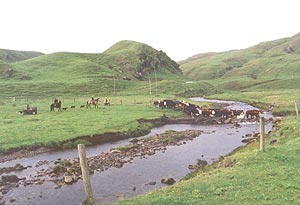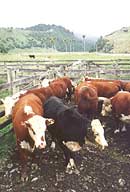The father and son partnership of Harry and David Richards, farm a property at Paturau, which has been owned by the family for several generations. The original 4,000 acre property is situated one and a half hours drive from Takaka in Golden Bay, west to Westhaven Inlet, and south to the rain enforced isolation, between the Anatori and Turimawiwi rivers. Things happen at a different pace down here.
Harry's grandfather owned land at Paturau in 1898, and by 1910 his father and uncle would travel south by pack horse with supplies to the bush and flax covered wilderness of Turimawiwi, to chip away at the undergrowth and spread grass seed. The early mobs of cattle were driven up the tidal beaches and over the Takaka hill to a Hardy street butchery in Nelson, a character building journey of six days.
In the mid 1980's the original property was divided roughly in half, and today Harry and David own and manage three separate properties. With 530 hectares at Turimawiwi, 240 hectares further north at Paturau, and an intensive fattening block over the hill in the Redwood Valley. The combination of properties allows flexibility when trying to get stock to the Alliance Nelson Plant for slaughter, still a large and difficult logistical exercise, due to the weather and the famous wild nature of some of the stock.
Dave Miller has been a stock agent for over 17 years, and has liased between Alliance and the Richards for many years. He jokes how Sollys Transport would have their trucks booked into the panel beaters the next day, due to their reputation of damaging stockcrates.
"Everyone at the works would know when the Richards cattle from Turimawiwi were coming. They were taken straight off the truck, and up the kill chute, before they could clear the yards and head off across the mudflats, there's probably one still out at Rabbit Island today."
At least one animal has been known to get up in the sticking box and escape into the plant, scattering butchers, and requiring the foreman to hunt it down with a rifle, eyeball to eyeball.
Yet ultimately, being essentially a West Coast property with a scattering of nikau palm groves, it is the rain and river crossings that provide the biggest obstacles. David Richards described how the weather has often passed over them, before they get the forecast, with rivers rising to a dangerous level within minutes, often as a noisy and threatening wall of water.
"We have some horrendous floods, you wouldn't believe it," David said. "The river valleys, the whole place just fills up and goes for the sea with waterfalls coming out of the cliffs. It happens so often that it's as if the place was designed for it. It's remarkable the little amount of erosion, compared to the size of the floods."
Harry agreed saying people who come down to visit, and who plan to go back the next day, can have trouble when it rains. "There is always some reason why they have to go out, and its quite dangerous. You are far better to stay longer, put a stew or a feed on, you've got all the comforts here, because tomorrow, who knows, the river should be down."
Milling operations in the area in the early 1980's saw roads improved significantly with deviations, cuttings and changed cambers which allowed easier access for bigger and better stock trucks. Yet still, the works weren't keen on receiving the Richards cattle late in the week, in case of breakdown, they couldn't contain them over the weekend. The cattle didn't know what a fence was and had no respect for it - they just go through them.
"You see fences don't last around here," David explained, due to the salt spray blasting in off the Tasman Sea. "Standard staples last about 5 years. We have 530 hectares here divided into five paddocks. Everything has to be double galvanized, staples, gudgeons and hinges. It's disconcerting because you build something and it just falls to bits," he said with a smile.

The property fertility was high for many years but began to run out in the 1960-70's, when the pH started to drop, and the nutrients began to run low. They began liming and once put on 3,000 tonnes in two years. Originally applied by air, they can now apply a third of their fertiliser requirements by truck.
"Every year we are putting more tracks in," Harry said. "The motorcycle riders want to be able to get around and by doing that we can get a lime truck around too. We put in 35 culverts last year and 600 tonnes of lime on, besides the fertiliser." And David added, "we are after fattening tucker here, we are not just a dry stock breeding herd. We want to get the stock to market quicker, we only sell to the works for slaughter - not through the yards."
An unfortunate side effect of raising the soil fertility, was the flourishing ragwort crop, which at one point was poisoning a beast a week. Spraying the ragwort had a negative effect on the pasture quality by reducing clover content and so increasing sheep numbers has proved the most effective method of control. "The higher sheep numbers have stopped that, but we are still in a position that if we let up for six months, it would get away again," Harry commented.
Other obstacles include liver fluke, due to the high numbers of snails that act as secondary hosts for the parasite. When applying fertiliser mixes, trace elements, selenium, copper, cobalt are also applied to eliminate the need for drenching for those deficiencies.
The unique location and lifestyle that this remote pocket of New Zealand affords easily outweigh any hardships. "I just love it down here," Harry enthusiastically declared, "there is one part, up the river there, I call it the promised land, a beautiful bush valley." For David, it is the hunting, fishing and the casual pace, "we don't stress about things, if something goes against you, you just walk away."

